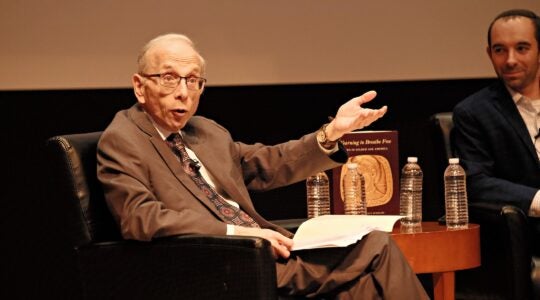Donald Trump has long insisted that he is not an anti-Semite; indeed, he regularly trots out his daughter as a convert to Judaism — to Orthodox Judaism, no less.
The problem with Trump is not blatant anti-Semitism, or anti-Islamism; I’m not afraid that the Republican candidate will pass “Nuremberg Laws” or kick out Muslims. The problem is that his rhetoric, and that of many of his followers, has created an atmosphere that suggests that behavioral anti-Semitism—which not long ago was a serious no-no in American life (“I can think it; I can’t say it!”) — may have a new legitimacy. You can once again blame people of color, or immigrants, or Jews for the problems you (and “you” are middle-class whites) are facing. After all these years, it may be O.K. again to be racist.
What Trump is doing, then, is engaging in the cynical use of anti-Semitism and racism for the purpose of achieving political gains. This is the worst kind of anti-Semitism—far worse than most forms of behavioral anti-Semitism, because what political anti-Semitism does is poison the political atmosphere, with the possibility of residual effects far beyond the instant political manifestation.
There are good reasons why many in the extremist (and perhaps not-so-extremist) anti-Semitism camp are supporting Trump. He is a public figure — running for president, no less — who is giving anti-Semites and racists license to express their views. To be sure, expression of views is entirely legitimate; it’s constitutionally protected. But here is a case in which a public figure tolerates, indeed enables, such expression. Why? Because he needs their votes.
America in 2016 is a country in which we make a distinction between whatever anti-Semitism is out there—and there is precious little, both behaviorally and attitudinally — and Jewish security, which is the ability of Jews, individually and as a polity, to participate in the society at any level. This is a crucial distinction. It is hard to find a Jew in the U.S. in 2016 who cannot participate in society because of anti-Semitic animus. Jewish security in America is strong, and is likely to remain so, because of the strength of our constitutional protections and because of the improvements over the past half-century in the social and economic conditions of the society.
But we now have a candidate for high office who in effect excuses the actions of anti-Semites, as Trump did in his refusal early on to repudiate Ku Klux Klan leader David Duke’s support, and as his supporters did in making vitriolic online anti-Semitic attacks directed at journalist Julia Ioffe (after her GQ profile of Melania Trump). Trump’s candidacy might suggest that the distinction between anti-Semitism and Jewish security could become blurred in some quarters.
Not to be forgotten in the question of anti-Semitism is that of Israel, anti-Zionism and Israelophobia. Let me connect a few dots.
The relationship between anti-Zionism and anti-Semitism is nuanced; it’s a threshold issue. My test? Any criticism of the policies of the Israeli government is entirely legitimate. In Israel itself, in fact, such criticism goes far beyond the harshest criticism we hear in America. The point at which it is not legitimate, where the line crosses into anti-Semitism, is the point at which the legitimacy of Zionism is denied, and by extension the legitimacy of the State of Israel.
The issue with Trump is not his early declaration of “even-handedness” in the Arab-Israeli conflict; it is the Trumpist atmosphere created by the campaign’s rhetoric in which “anything goes” is the new catchphrase. My fear is that under a Trump presidency there will be more at risk than foreign aid. My sources in Washington tell me that the very question of Israel as crucial to American interests is being bandied about in the Trump camp. This comes close to Israelophobia of the worst kind.
Is Trump an anti-Semite? I don’t know—and I don’t much care. But he is far worse than an anti-Semite. The person who does not believe in anti-Semitism, yet uses it for political gains, is a dangerous person indeed.
What, in fact, is an anti-Semite? The standard definition — hatred of Jews without specific cause — is workable, but does not quite get at the problem. Then there is the old saw, “an anti-Semite is someone who hates Jews more than is absolutely necessary.” I like that one, because it talks to the utter irrationality of anti-Semitism. Perhaps the best definition, appropriate to the matter at hand, is a paraphrase of Justice Potter Stewart’s definition of pornography in Jacobellis v. Ohio: “I can’t define it, but I know it when I see it.”
Well, I know it when I see it. And I see it in Donald Trump’s campaign for the presidency.
Jerome Chanes, a regular contributor, is the author of four books on anti-Semitism. He is a fellow at the Center for Jewish Studies at the CUNY Graduate Center.
The New York Jewish Week brings you the stories behind the headlines, keeping you connected to Jewish life in New York. Help sustain the reporting you trust by donating today.




